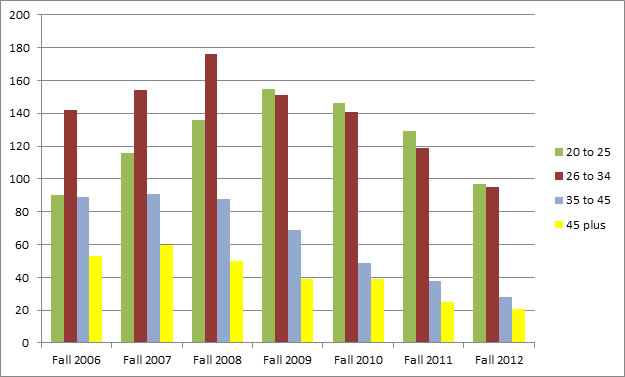Standard IV. Students
IV.1 The school formulates recruitment, admission, financial aid, placement, and other academic and administrative policies for students that are consistent with the school's mission and program goals and objectives; the policies reflect the needs and values of the constituencies served by a program. The school has policies to recruit and retain students who reflect the diversity of North America’s communities. The composition of the student body is such that it fosters a learning environment consistent with the school's mission and program goals and objectives.
At the School of Information Sciences, there are clearly defined policies for admission, financial aid and administrative activities pertaining to the recruitment and retention of students. These are reviewed regularly, and revised if necessary, to ensure the success of students and that the policies are consistent with the goals of the School and the academic programs. At the University of Pittsburgh, there are minimum criteria for admission to any graduate academic program: individual units must meet, and may exceed, these minimum requirements. In the School, the program faculty review the admissions and financial aid requirements and policies for their academic program, considering and voting upon any changes. The changes are then presented to the SIS Council, which helps to ensure compliance and consistency across the School’s many programs. The administrative policies for students’ enrollment, grading, and progress-to-degree are determined by the program faculty and clearly outlined on the School’s Web pages. In addition, new students are provided with an orientation experience and a Graduate Student Handbook which details the critical policies and procedures. In general, these policies can be categorized into recruitment/admissions, financial support, academic/course-related, and completion.
Recruitment/Admissions Policies for the MLIS Program
The School designs recruitment plans for each of the degree programs, to be implemented from August-December of each academic year. These plans are included in the Appendix STU 2. The plans are reviewed thoroughly each year to determine their effectiveness in increasing the School’s applicant pool. The review then facilitates decision-making for the recruitment efforts for the following year. Primarily the plans address advertising efforts, direct mail campaigns, graduate and recruiting event attendance, and outreach to specific target audiences. The plans are developed by the iSchool’s recruiting staff and reviewed by the Manager of Student Services, the Director of Administration and the Director of External Relations.
Admissions policies/criteria for the MLIS program are located here. Students must have earned a Bachelor’s degree from an accredited college or university with a minimum scholastic average of a B grade (3.0 on a 4-point scale).
The University’s Affirmative Action and Nondiscrimination Policy states that:
The University of Pittsburgh, as an educational institution and as an employer, values equality of opportunity, human dignity, and racial/ethnic and cultural diversity. Accordingly, the University prohibits and will not engage in discrimination or harassment on the basis of race, color, religion, national origin, ancestry, sex, age, marital status, familial status, sexual orientation, gender identity or expression, disability, or status as a disabled veteran or a veteran of the Vietnam era. Further, the University will continue to take affirmative steps to support and advance these values consistent with the University's mission. For the complete policy, click here.
The applicant must submit an online application, official transcripts for all previous education, two letters of recommendation, the scores from the GRE or the Miller Analogies Test (unless an advanced degree has already been earned), a resume or CV, a statement of intent outlining academic or professional goals, and an application fee. The MLIS program has one Term of Entry, the Fall Term. The School’s Web site identifies the appropriate deadlines for applications for admission and other documentation. International applicants must meet different deadlines (to allow for processing of visa and INS documentation) as well as admissions criteria regarding their abilities to undertake graduate study in English. This information is clearly spelled out on the iSchool’s admission Web page at http://www.ischool.pitt.edu/admissions/.
Admission Deadlines for Domestic Applicants
Degree Program |
Fall Term |
Spring Term |
Summer Term |
MLIS |
January 15th |
||
MLIS: Pitt Online |
July 1st |
||
PhD LIS |
January 15th |
||
MSIS* |
July 15th |
November 1st |
March 15th |
PhD IS |
January 15th |
||
MST* |
January 15th |
September 15th |
January 15th |
PhD Tele |
January 15th |
September 15th |
January 15th |
*Rolling Admissions. However, priority consideration will be given to applications received by these deadlines.
For International Students Only
In order for the iSchool to be in compliance with the deadlines established by the Office of International Services (OIS), all international students must have their admission credentials and their proof of financial resources submitted far in advance, according to the term of entry. Meeting these dates will insure that all required visa documents are issued by the INS to prospective international students in time for the beginning of each term's studies.
Deadlines for International Applicants
Term of Admission |
iSchool Admission Application |
Supplemental Form (Parts I and II, Proof of Financial Resources) |
Fall |
January 15th |
June 15th |
Spring |
June 15th |
October 1st |
Summer |
December 15th |
March 1st |
The iSchool’s policy for English Language Proficiency states:
A minimum score of 550 (paper-based) or 80 (Internet-based) on the TOEFL is required for admission to the MSIS, MST, MLIS, PhD IS & TELE programs. [For the LIS PhD, the minimum scores are 600 (paper-based), 250 (computer-based) or 100 (Internet-based).] Students may choose to take the International English Language Testing System exam (IELTS) in place of the TOEFL. Students should receive a minimum result of Band 6.5 on the IELTS. [For the LIS PhD, the minimum requirement is Band 7.0.] Exceptions: International students who completed a degree at a regionally accredited college or university in the United States are not required to submit a TOEFL/IELTS score. Students from certain English-speaking countries are also exempt (see www.ois.pitt.edu for a list of exempt countries). Permanent residents are exempt. However, the School reserves the right to ask for TOEFL scores if deemed necessary for the evaluation of the application. Prior to registration, students with TOEFL scores of less than 100 (Internet-based), 600 (Paper-based) or less than Band 7.0 on the IELTS must take this additional test of English language proficiency: English Language Proficiency Test (the Michigan Test). If remedial courses in English as a foreign language are recommended, the student must complete the remedial course during the first two terms of study.
Recent revisions to the admissions policies include:
- The requirement to submit GRE scores for applicants to the Fall 2013 Term and beyond. This brings the MLIS admissions requirements in line with those of the other Master’s programs in the School and those of other ALA-accredited MLIS programs in the United States.
- Applicants to the Archives, Preservation, and Records Management specialization must demonstrate the following in their personal statements – the equivalent of a year’s experience in archives and special collections units, knowledge of the APRM field, and clear professional goals that can be supported by this academic program.
- In 2011, the faculty voted to limit the Terms of Entry to the Fall Term only. It was felt that it would provide the structure needed for a more coherent program of study for the students, and a more substantial peer support system, as the students would be travelling through the core courses as a de facto cohort. In addition, this facilitates scaffolding of learning in advanced courses. This was implemented for Fall 2012, so there are no evaluations or outcomes available to us about the successes or challenges in implementing this policy.
The Student Body at the iSchool – Changes over time chart is available on-site.
The MLIS Student Body (online and on-campus) at the iSchool – Changes over time chart is available on-site.
The iSchool is strategically right-sizing the enrollments across programs. The enrollments in the Information Science and Telecommunications programs declined after the dot.com bust in 2001. The online MLIS program permitted more students to be enrolled in the MLIS program due to increased capacity and to counterbalance the losses in other programs. With the judicious decrease in the number of MLIS students, increases in the number of students admitted to the Information Science and Telecommunications programs, the programs are approaching equity in terms of teaching and advising loads. The increased number of MLIS students, from 2006-2010, was particularly difficult on faculty. They were left with less time for research and/or service. The more even distribution of students across all degree programs should alleviate some of these challenges. As this is a relatively new endeavor, the results have not yet been evaluated.
The economic decline has had its effects on the MLIS enrollments. The program has enrolled a higher proportion of full-time students in the on-campus program. The online program has seen a slight decline in enrollments. These effects are not unexpected given that there is little or no financial support (school or federal) for part-time study, which can be a hardship for potential students.
MLIS On-campus enrollments, part-time versus full-time
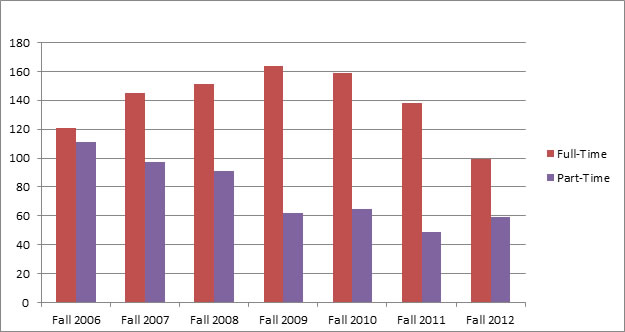
Age of MLIS Students, from Fall 2006-2012
As can be seen in the chart above, there is a marked difference in the ages of students enrolled in the MLIS program over the timeframe of this study. The chart indicates the severity of this change in the new student population. The Program is enrolling fewer students aged 35 and above. The number of students aged 20-25 has increased significantly from 2006 to 2012. This change has implications for the style of teaching, delivery methods, curricular elements, expectations of students, cohort-building, advising and offering meaningful co-curricular events. This shift has changed the classroom character and perceptions about “typical” students in the program. For many years, there was a significant cadre of 35+ students – many of whom were changing career. Now, the predominant group of students has completed their undergraduate studies within 2-4 years. These millennial-generation students have very different expectations of their learning experience – viewing themselves as customers, rather than passive recipients of knowledge, for example. They also come to the program with little or no experience in libraries or information centers – the iSchool has increased opportunities for such students to gain practical experience through the Partners Program, field experience courses, and alumni interventions.
MLIS New Students Age, Fall Terms 2006-2012
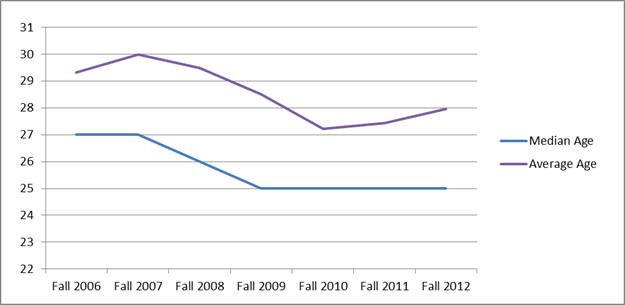
Gender composition for this program has been relatively stable for the prior six years. The majority of students are female, which is not unusual in LIS programs. According to the ALISE 2012 Statistical Report, almost 80% of students enrolled in the ALA-accredited Master’s program are female.
Gender Composition - MLIS (on-campus and online), 2006-2012
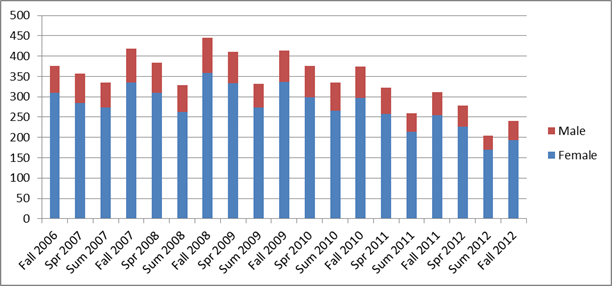
Students have the option to select “unknown” as a gender choice.
Ethnicity Composition - MLIS (on-campus and online), 2010-2012
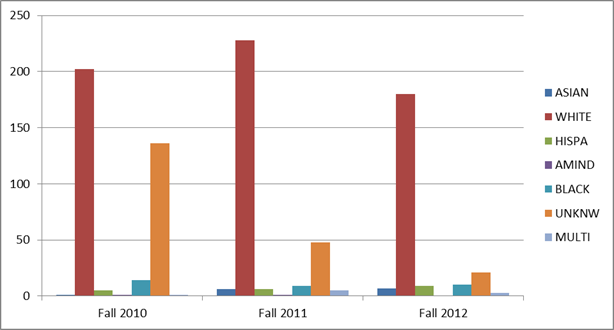
Unknown – ethnicity not identified by student
Multi – student indicated multiple ethnicities, not specific
As revealed in the chart above, the majority of the MLIS student body has self-identified as “White.” This is a phenomena experienced by a majority of LIS programs. Again, according to the 2012 ALISE Statistical Report, of the 18,640 students enrolled in the ALA-accredited programs, 13,172 were self-identified as “White.” Therefore, slightly more than 70% of MLIS students covered by the survey had self-identified as being “White.”
The iSchool is trying to address this lack of diversity in the student body through several mechanisms. First, the recruiting staff are now attending several major conferences for students from underrepresented populations including the Hispanic Association of Colleges & Universities Annual Conference, the National Conference on Higher Education (formerly the Fattah Conference), and the National Society of Black Engineers’ Annual Conference.
The iSchool has played a leading role in creating national partnerships to further its goals of increasing the diversity of the student pool. For example, the School partnered with the University of the Virgin Islands to secure funding from the Institute of Museum and Library Services (IMLS) to support 25 students from the Virgin Island Territories (a majority of whom were African American) as they earned their MLIS degree. A similar grant-funded project provided scholarships for paraprofessionals in the Philadelphia Free Library System, who were primarily African American and who worked in an underserved community.
The iSchool has a successful track record in attracting and retaining Spectrum Scholars, a nationally-competitive diversity program administered by the American Library Association (ALA). More than 24 scholars have enrolled in the MLIS Degree Program since the Spectrum Scholarships were first offered in 2000; the iSchool has matched the Spectrum funds for these students.
The School collaborated with the ALA Spectrum Initiative on a project to fund the studies of 12 doctoral students from underrepresented groups – this project was also funded by the IMLS. Two doctoral students enrolled in the iSchool’s LIS PhD Program as part of the Spectrum Doctoral Fellowship Program.
The National Science Foundation has funded a Cybersecurity scholarship program for the Security Assured Information Systems (SAIS) track at the iSchool. The scholarships support graduate students in Information Science or Telecommunications and Networking taking the SAIS-track option. The scholarship program emphasizes the recruitment of underrepresented groups to ensure a more diverse and wide-ranging pool of qualified IA professionals. The faculty targeted having 30% of the scholarship recipients coming from an underrepresented group.
The School has attracted endowment and corporate funding for scholarships that will benefit students from underrepresented groups, including the E.J. Josey Endowment Scholarship for Minorities, the Alcoa Ambassador Scholarship Program, the Diversity Librarian Fellowship and Residency Program, and Commonwealth funds that are directed to recruit and retain such students.
In order to increase the applicant pool of diversity students for graduate iSchool programs across the country, the iSchool designed, developed and implemented the iSchool Inclusion Institute (i3). The i3 project is designed to encourage undergraduate students from underrepresented groups to consider graduate study – and perhaps, joining the professoriate – in the Information Sciences disciplines. With the support of the Andrew W. Mellon Foundation, totaling $700,000, the School will host 60 students in three cohorts from 2011‐13.
Residency Status of MLIS Students, 2006-2012
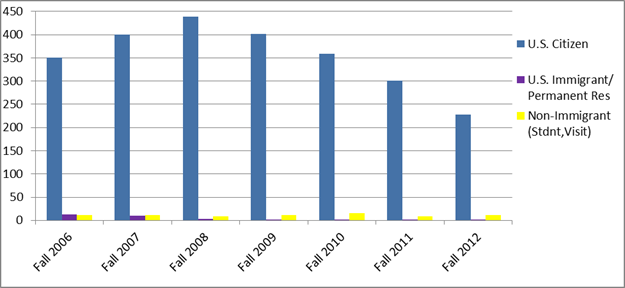
The MLIS student group is comprised mostly of students who hold U.S. citizenship. In contrast, the student populations in the iSchool’s Information Science and Telecommunications programs are primarily international. The School has seen few international students in the MLIS program for many years, although the countries represented have varied to some extent. Through a series of community-building and academic events, the MLIS students have ample opportunities to interact with the Information Science and Telecommunications students, the majority of whom are international. In addition, the international enrollment in the LIS PhD program has been consistently robust, and since many doctoral students function as TAs and TFs, MLIS students have ample opportunities to interact with international students and to learn about international perspectives.
Countries of Residency, MLIS Program, 2009-2012
|
AY 2009-2010 |
AY 2010-2011 |
AY 2011-2012 |
Bermuda |
3 |
|
|
Canada |
6 |
5 |
2 |
China |
5 |
14 |
8 |
Egypt |
|
3 |
|
Germany |
3 |
|
|
Japan |
2 |
1 |
|
Korea, South |
1 |
|
|
Kuwait |
3 |
|
|
Singapore |
1 |
3 |
1 |
Switzerland |
|
1 |
3 |
Taiwan |
3 |
2 |
|
Trinidad and Tobago |
8 |
8 |
|
As has been much discussed in higher education media outlets, the proportion of students from China has increased significantly, even in a program that has a small international population. These students, while adding to the diversity of the school, have different needs and challenges in the classroom. The program faculty have enforced stringent admissions requirements with regards to proficiency in written and spoken English: the admissions policy mandates a higher score on TOEFL than is required by the University.
The majority of MLIS students come from within the Commonwealth of Pennsylvania; the remainder is from more than 40 states. The School is seeing a decline in the number of Pennsylvania residents in the program, which is not unexpected given that the enrollments in the MLIS program were being strategically managed in light of recent declines in the number of faculty available to teach in this program. Pennsylvania residents have several other options for acquiring the ALA-accredited MLIS degree (there are two other accredited programs in Pennsylvania): it might be assumed that students facing financial pressures would select institutions closer to their homes, rather than moving.
MLIS Students, in-state versus out-of-state, 2006-2012
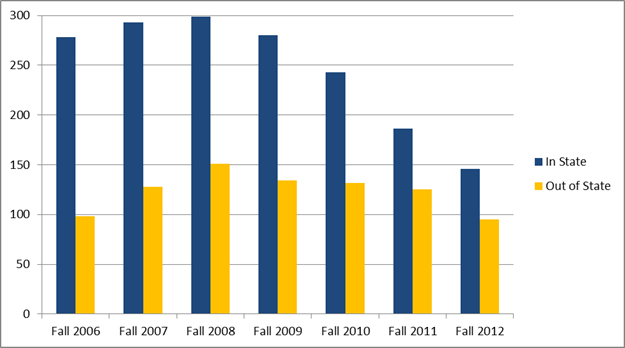
MLIS Students – changes in selected states of residency, 2006-2012
State |
Fall 2006 |
Fall 2007 |
Fall 2008 |
Fall 2009 |
Fall 2010 |
Fall 2011 |
Fall 2012 |
CA |
4 |
3 |
5 |
6 |
4 |
3 |
3 |
IL |
3 |
3 |
3 |
7 |
6 |
2 |
2 |
MD |
10 |
10 |
10 |
8 |
9 |
7 |
7 |
NY |
5 |
9 |
9 |
9 |
6 |
3 |
2 |
OH |
8 |
12 |
25 |
13 |
10 |
9 |
8 |
SC |
1 |
|
|
1 |
|
4 |
3 |
VA |
5 |
6 |
7 |
3 |
8 |
10 |
11 |
WA |
|
1 |
5 |
3 |
2 |
2 |
2 |
WV |
5 |
4 |
3 |
4 |
5 |
2 |
1 |
The table above provides a snapshot of the changes in the states of residency among MLIS students. Of note, enrollments from Ohio have declined a great deal, while the number of students from Virginia has increased. This decrease in students from Ohio might be attributed to the severity of the economic decline in that state: students may be choosing to study at an in-state institution.
Financial Support Policies for the MLIS Program
The MLIS financial support information of critical importance is provided on this Web page. In general, financial support is awarded on the basis of merit, need and availability of funds. The Program Chair, with recommendations from the faculty, considers specific criteria in making these awards:
- academic attainment;
- experience and skills matched to program and/or faculty needs;
- experience and skills matched to stated career objectives;
- volunteer and community services and activities; and
- evidence of financial need.
Students eligible for financial support are those accepted for full-status admission or currently enrolled full-time in the degree program, and those who have not already received three terms of funding. It is University policy that only full‐time students are eligible for funding. Full‐time enrollment is defined as registering for a minimum of 9 credits, but no more than 15 credits, in the Fall and Spring Terms, and a minimum of 3 credits in the Summer Term.
Priority is given to U.S. citizens in evaluating financial support applications. All international students are expected to come fully funded for their entire degree program and any advanced study they may undertake in a certificate program or in a second degree program. International students may be granted financial aid such as the awarding of a Graduate Student Researcher (GSR) for a funded project.
The University of Pittsburgh is committed to providing educational opportunities for qualified diversity students through financial assistance. In accordance with this policy, students from underrepresented groups are strongly encouraged to apply for financial support. In some cases, aid is specifically designated for the support of these students.
Categories of funding/support include graduate student assistantships, Commonwealth Funds, and special scholarships. Each category is fully described here.
In spite of decreases in financial support to the School, the LIS program has increased the proportion of MLIS students receiving some form of financial support from the school (this would be in addition to any federal or private funds).
Proportion of MLIS Students given iSchool financial support, 2006-2012
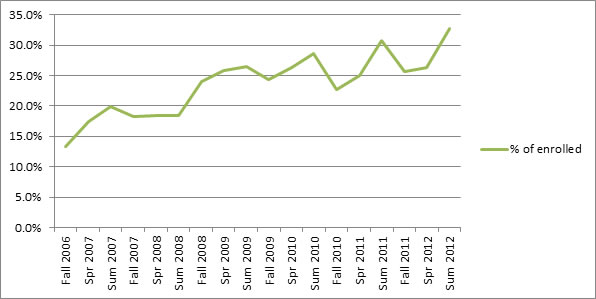
In addition, the LIS program has increased funding for PhD students since 2009, to enhance the number of doctoral students in the program. This was determined by the faculty to address several issues: the national call for more LIS educators and the need for more TAs and TFs in the iSchool’s MLIS program.
The School has been successful in acquiring scholarship funding from a number of prestigious agencies including the Institute of Museum and Library Services and the National Science Foundation.
Academic/Course-related Policies for the MLIS Program
Maintenance of a 3.0 QPA
Each student must maintain a 3.0 Quality Point Average (QPA) for the 36 credits of graduate level coursework required for the MLIS degree and must have a 3.0 QPA at the completion of the 36 credits to graduate from the MLIS program.
Academic probation/dismissal from the program (Updated 03/29/2010)
Failure to maintain a 3.0 QPA in any term will result in the student’s being placed on academic probation immediately. If the student does not raise his or her QPA to at least a 3.0 after the next six credits completed, the student will be dismissed from the MLIS program.
Grading policies
A student must earn a grade of B or better in each core course and must maintain a QPA of 3.0 each term with no grade for an elective course below a C. If a grade of B or better is not earned in a core course, the student must register for the course in the next term offered and earn a grade of B or better. A core course may be repeated only once.
Grades for core courses (Updated 03/29/2010)
The four required core courses are:
•LIS 2000 Understanding Information
•LIS 2005 Organizing and Retrieving Information
•LIS 2600 Introduction to Information Technologies
•LIS 2700 Managing and Leading Libraries & Information Services
In addition to earning a grade of B or better in LIS 2000 Understanding Information and LIS 2600 Introduction to Information Technologies, students declared in the Archives, Preservation and Records Management specialization must earn a grade of B or better in LIS 2220 Archives and Records Management (which fulfills the management core requirement), LIS 2222 Archival Appraisal, LIS 2223 Archival Access, Advocacy and Ethics, and LIS 2224 Archival Representation (which fulfills the core requirements in the organization and retrieval of information). [From Fall 2013, LIS 2215 Preservation Management replaces LIS 2223 as a required course for the revised Archives and Information Science specialization]
Students in the School Library Certification Program must earn a grade of B or better in LIS 2774 School Library Media Center Management, which fulfills the management requirement.
Grades for elective courses
All students must earn satisfactory grades in each elective course taken. Grades of C-, D+, D, D-, F and Unsatisfactory are unacceptable for credit toward graduation. A course for which such a grade is earned must be replaced with another course or retaken, with a higher grade earned. In either case, a higher grade must be earned and a 3.0 QPA be maintained. A course for which a grade of C- or lower was earned may be repeated only once.
Academic provisional admission
At the discretion of the Admissions and Review Committee, a very limited number of students who do not meet the 3.0 QPA minimum required for full admission into the MLIS program may be considered for admission. If such students are able to provide additional evidence of academic potential (e.g., outstanding scores on the Graduate Record Exam or the Miller Analogies Test) or professional potential (e.g., outstanding letters of recommendation and/or outstanding work experience), they may be admitted to the MLIS program with academic provisions. Such students must earn a B average (3.0 QPA) in the first four courses taken. Failure to achieve a 3.0 QPA at the conclusion of the first 12 credits will result in dismissal from the MLIS program.
The iSchool/program policies and procedures are collated here. These policies address areas including academic integrity, enrollment, advising, course registration (including add/drop and special permission), academic records, leaves of absence, resignation, and Disability Resources and Services for on-campus and online students.
University of Pittsburgh Policies are also gathered here. There are official policy statements for topics such as affirmative action, responsible computing, drug-free workplace, sexual harassment, research integrity and the Student Code of Conduct.
Completion
The iSchool has several policies and procedures that pertain to students successfully completing their program of study, which are listed here. These policies and procedure statements address applying for graduation, statute of limitations, using the University’s career services group, proof of enrollment and upcoming graduation, and the opportunities to participate in the School’s and the University’s alumni groups.

